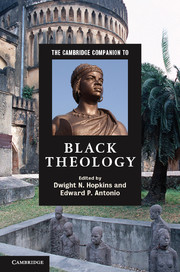Book contents
- Frontmatter
- Part I Introduction
- Part II Themes in black theology
- 6 God
- 7 Jesus in black theology: the ancient ancestor visits
- 8 Black theology and the Holy Spirit
- 9 Black theology and human purpose
- 10 Theology's great sin: silence in the face of white supremacy
- 11 Theodicy: “De Lawd knowed how it was.” Black theology and black suffering
- 12 Black theology and the Bible
- 13 Protestant ecclesiology
- 14 Roman Catholic ecclesiology
- 15 Dignity and destiny: black reflections on eschatology
- Part III Global expressions of black theology
- Further reading
- Index
- Other titles in the series
8 - Black theology and the Holy Spirit
from Part II - Themes in black theology
Published online by Cambridge University Press: 28 September 2012
- Frontmatter
- Part I Introduction
- Part II Themes in black theology
- 6 God
- 7 Jesus in black theology: the ancient ancestor visits
- 8 Black theology and the Holy Spirit
- 9 Black theology and human purpose
- 10 Theology's great sin: silence in the face of white supremacy
- 11 Theodicy: “De Lawd knowed how it was.” Black theology and black suffering
- 12 Black theology and the Bible
- 13 Protestant ecclesiology
- 14 Roman Catholic ecclesiology
- 15 Dignity and destiny: black reflections on eschatology
- Part III Global expressions of black theology
- Further reading
- Index
- Other titles in the series
Summary
At the dawning of the era of slavery, captured West African peoples in the New World (of North and Latin America and the Caribbean) joined their voices in shouts, moans, and deep groaning of their inner spirit. Calling on God's Spirit to manifest itself, they looked for a release from captivity and bondage. What W. E. B. DuBois called the “spiritual strivings” of black folk were uttered before the master in whispers, subvocalizations of agony, or in the times of gathered worship in what were called “hush harbors.” The hush harbors were the secret places where enslaved black folk could experience the Holy Spirit as an enlivening, wondrous, and overwhelming experience. Outside of the seeming omnipresence of the master's ears, these enslaved African peoples forged a relationship with God through their experience of the Holy Spirit. Following DuBois' instructive musings, these enslaved people allowed the Spirit to whip them into the utterly primal, emotional, and effervescent experience of what DuBois called “the Frenzy.”
This Spirit-induced Frenzy was not always welcomed by all black folk, especially in the early nineteenth century. Eminent Christian physician Martin Delaney derided many black churches for what he believed to be their spirituality of excessive otherworldliness and crude imitation of white church moralism. Episcopal pastor Alexander Crummell sought to de-emphasize what he considered to be the overly zealous spirituality in black churches – calling instead for a this-worldly, tough-minded, and politically activist, theologically informed spirituality.
- Type
- Chapter
- Information
- The Cambridge Companion to Black Theology , pp. 111 - 125Publisher: Cambridge University PressPrint publication year: 2012



